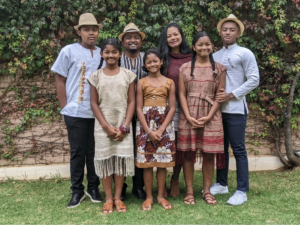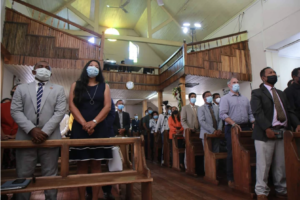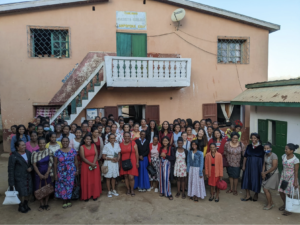
In the country of Madagascar off the eastern coast of Africa, many of the people embrace a simple proverb: “saying yes doesn’t break your neck.”
Said in a less-proverbial way: “it doesn’t hurt to be agreeable.” That sounds nice—and can certainly make arguments hard to come by—but it also complicates ministry. “If you ask a Malagasy if he believes in God, he will say yes. If you get more specific, ask him if he is a Christian, or if he trusts in Jesus, he will almost certainly say yes. Unfortunately, many people are just trying to be agreeable, but they don’t have true, Spirit-filled convictions.”
This cultural insight is from Faly Ravoahangy, who leads Madagascar 3M, a ministry that supports pastors throughout Madagascar, and is working to open a seminary to train the country’s future expositors. Faly is also a pastor at Ankadivato Biblical Baptist Church in Antananarivo, the capital of Madagascar. When asked how a minister can know if a Malagasy is simply applying the popular proverb, or confessing genuine faith in Christ, Faly said this: “You have to play the long game. You have to get to know them and understand who they are and what they truly believe.”
Faly is ideal for that role. The grandson of a pastor, Faly came to faith in Christ at the age of 15. He is Malagasy so he has an intimate knowledge of the culture. In God’s providence, Faly’s career in the oil industry moved him and his family to South Africa in the mid-2000s. There they joined Antioch Bible Church, where TMS alum Tim Cantrell is the pastor-teacher. At Antioch, Faly saw, for the first time, an expository ministry up-close. After a pastor’s conference in 2010, Faly had an unshakeable desire for full-time ministry. Over the next four years, the shape of that vision would come into clear focus—pastoral training in his native Madagascar. To fully prepare for that ministry, the Lord brought Faly and his family to California and The Master’s Seminary in January of 2015.
“I could go on and on about all the ways I benefited from my time at TMS” Faly said. “The way TMS emphasizes the authority of Scripture, personal holiness, the connection to the local church, and the school’s missions mindset. Training in those areas was the best possible preparation I could have received for my ministry in Madagascar.”
All that training, both in South Africa and at The Master’s Seminary, is the second reason Faly is ideal for ministry in Madagascar. He not only understands his own country; He understands theology. He knows how to preach. That makes him uniquely gifted as a communicator and shepherd to the Malagasy people.

“Faly is gifted in so many ways” Mark Tatlock said. He is the president of The Master’s Academy International, which has training centers around the world. Faly is in the process of developing a Madagascar training center through TMAI. “He’s gifted relationally. He’s good at bringing people together. He has a business background that is helping him build a school. And right now, he has around 50 young people volunteering as interns through his church and ministry. All of that shows his deep love for people.”
Missions leaders like Mark see Faly as an example of the end-goal of overseas ministry: local leaders who understand the culture and have as much training and theological conviction as any missionary. But what’s the most effective way to reach that goal? To produce those doctrinally-sound local ministry leaders? The answer always includes humility and patience.
Those virtues are not often associated with overseas missions work. Though local churches and missions agencies would certainly affirm their value—they are fruit of the Spirit after all—they rarely connect these qualities with the practical, day-to-day work a missionary does. Instead, there’s a lot of talk about how missionaries need to be self-starters or have an entrepreneurial spirit. There’s a sense in which that’s understandable. To evangelize and build a ministry overseas, an American needs to work hard, be creative, and not get discouraged by setbacks. But if a missionary’s work is going to last for generations, and potentially reshape the spiritual landscape in a country for generations to come, he must be marked by humility and patience. Both Faly and Mark understand this.
“The ideal missions work is long-term” Faly said. “It’s incarnational in the sense that you have to live with and among the people of Madagascar, or any country, if you are going to minister to them effectively. You need to stay with the people, learn how they live, and understand how sin expresses itself in their particular culture. You’re not there to come and do crusades and distribute tracks and get people to stand up and says, yes, I accept Jesus Christ. Malagasy people will respond to those events, but that doesn’t mean they will be truly changed.”
Faly is describing a ministry marked by patience. That virtue has defined effective missions work for centuries. David Livingstone, who is often called Africa’s greatest missionary, labored on that continent for 41 years, with just one convert to show for it. Likewise, William Carey spent 32 years in India, but only saw a few hundred converts. Yet today, Christianity has a foothold in both African and India and is growing rapidly in both parts of the world. In Faly’s home country, the work of a single missionary, Brinley Evans of Wales, established a single church in the capital, with a single local pastor, and then left more than a decade later. His patient, humble investment led to the formation of the denomination that Faly and his church is part of today.
“Just a few months ago, TMAI sent an American family to Madagascar to serve alongside Faly” Mark said. “Faly is the team leader. These American missionaries are part of the team. They are there to serve, equip, and train up many more leaders for the church in Madagascar.”
Humility is essential to the missions work that Mark is describing. Those going overseas are not there to take over ministry. They are there to strengthen the ministry already happening. And in Madagascar, they are there to serve under the leadership of a local pastor.
“It’s essential that missionaries not see themselves as more important than local leaders” Mark said. “Because the fact is, the local leaders are the ones who are going to be there for generations. Humility recognizes this and labors with that in mind.”
A truly humble and effective missionary also wants to work himself out of a job. That’s something Brian Biedebach, professor of pastoral ministry at The Master’s Seminary, and former missionary in South Africa and Malawi, has often said about missions work.

“When you go overseas to train pastors, your goal should be to train leaders that can take your job from you” Biedebach said. “Paul started churches during his missionary journeys. He trained men to lead those churches, and he left. That’s a model we should still be using in our work overseas today.”
Of course, Dr. Biedebach also finds directions for all missionaries in the great commission, though that famous passage in Matthew 28 is often misunderstood. Its command is connected to the church far more closely than most realize. “Everything in that text is tied in with ‘make disciples’ Dr. Biedebach said. “And the two aspects of that in the great commission are connected to the church. Baptism, which is conversion and identifying with the body of Christ. Then teaching, which is the everyday work of training and helping others become more like Christ. So the church is the perfect place for great commission work.”
Matthew 28: 19-20 “Go therefore and make disciples of all nations, baptizing them in the name of the Father and of the Son and of the Holy Spirit, teaching them to observe all that I have commanded you. And behold, I am with you always, to the end of the age.”
In Madagascar, that church building and strengthening is the essential work for missionaries and local leaders like Faly. There leaders can most effectively minister to a people who adhere to all kinds of cultural traditions, whether it’s a proverb like “saying yes doesn’t break your neck” or the ancestor worship that is so common in Madagascar.
“The people here often have a syncretistic faith” Faly said. “In other words, they combine elements of Christian theology with ancestor worship and other pagan rituals from the past. Regular, expository preaching in the church is the best way to address that. Teach the book of Hebrews, John 1, Colossians, and many other texts that talk about the superiority of Christ. That’s what this country needs.”
It’s also within the church context where Faly regularly experiences the joy of ministry in Madagascar. “There is a spiritual hunger right now” Faly said. “That gives us joy in ministry because people are looking for truth and we are proclaiming it through the church. And through our ministry, we’ve seen so many young people come to Christ. To now see Christ formed in them is such a joy.”
In the coming years, Faly is optimistic that there will be a revival in the church in Madagascar as long as the good work of church building—both by local leaders and missionaries—continues. “There is extraordinary opportunity here. And we are so grateful for all the Lord is doing in this country.”